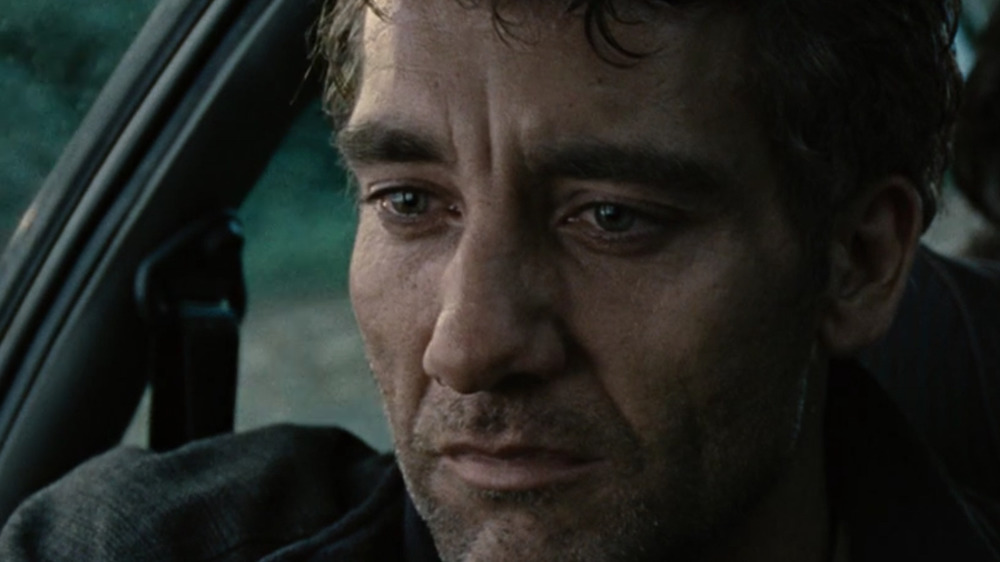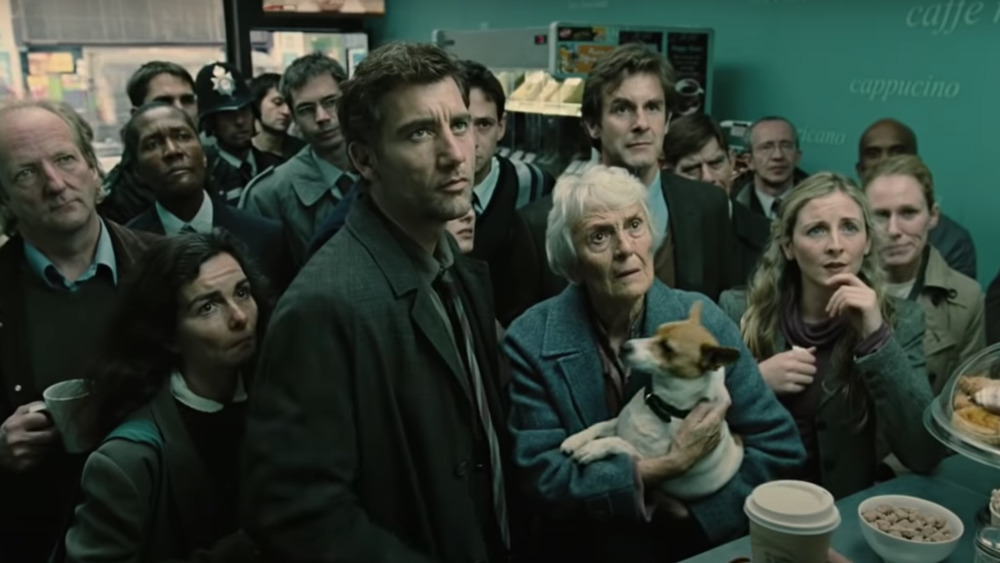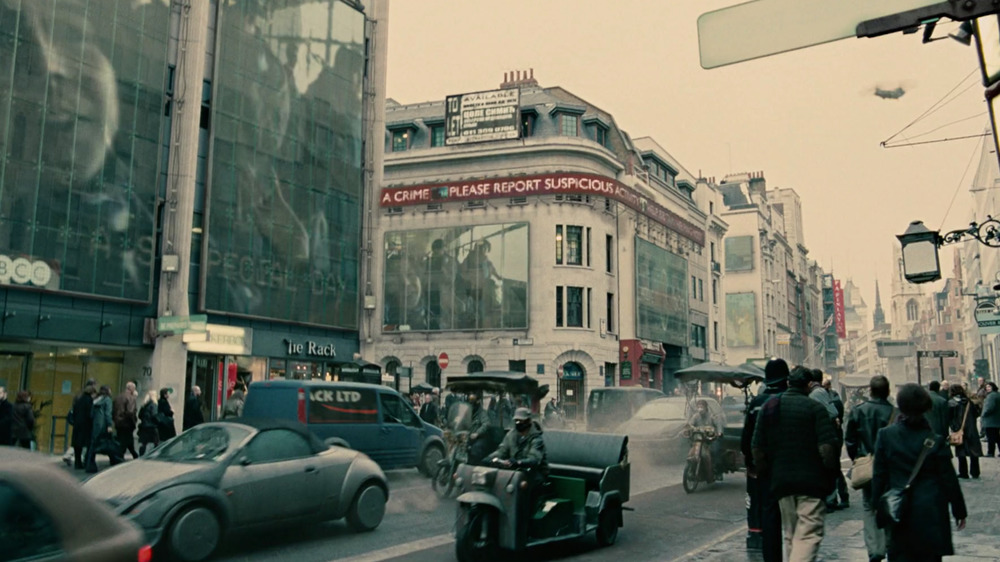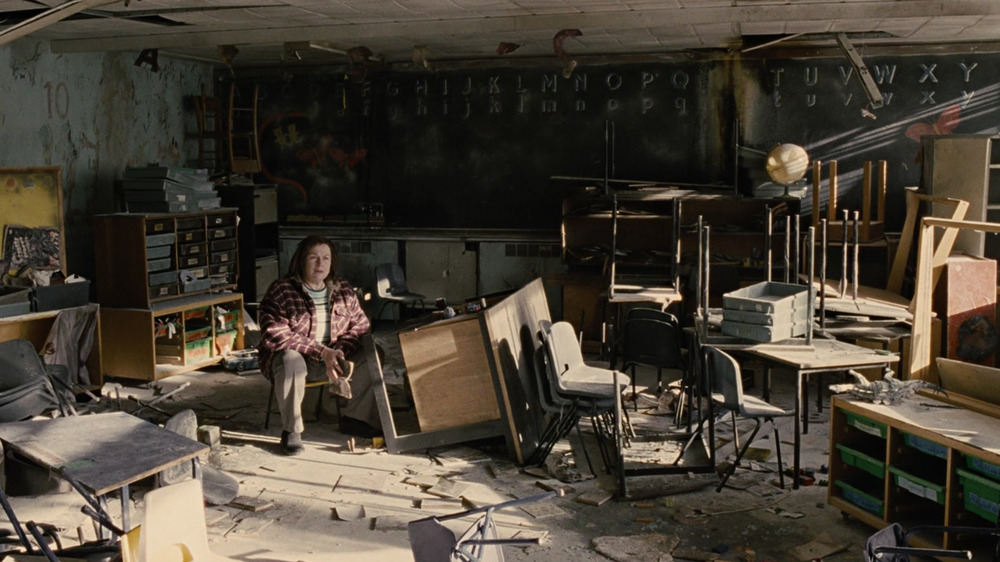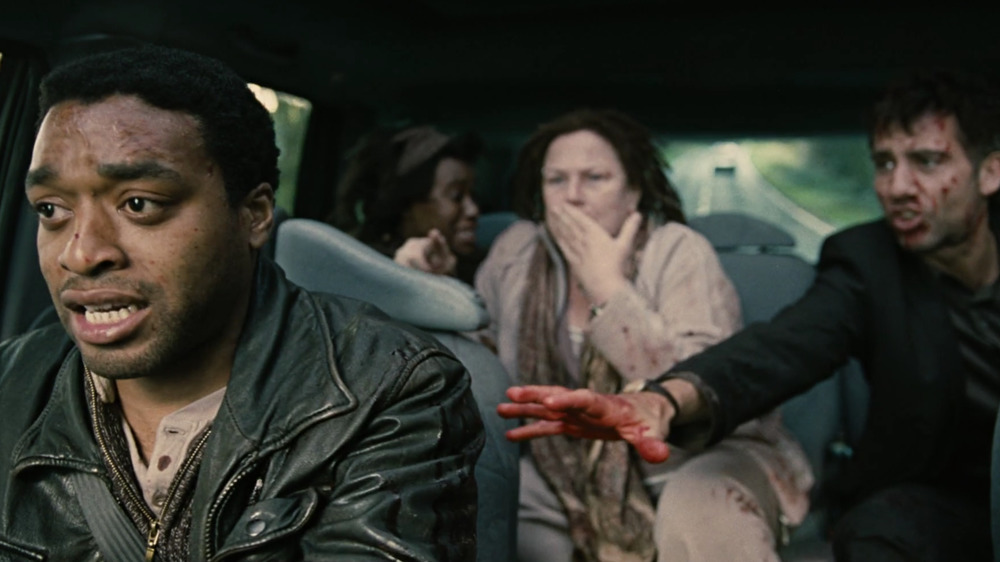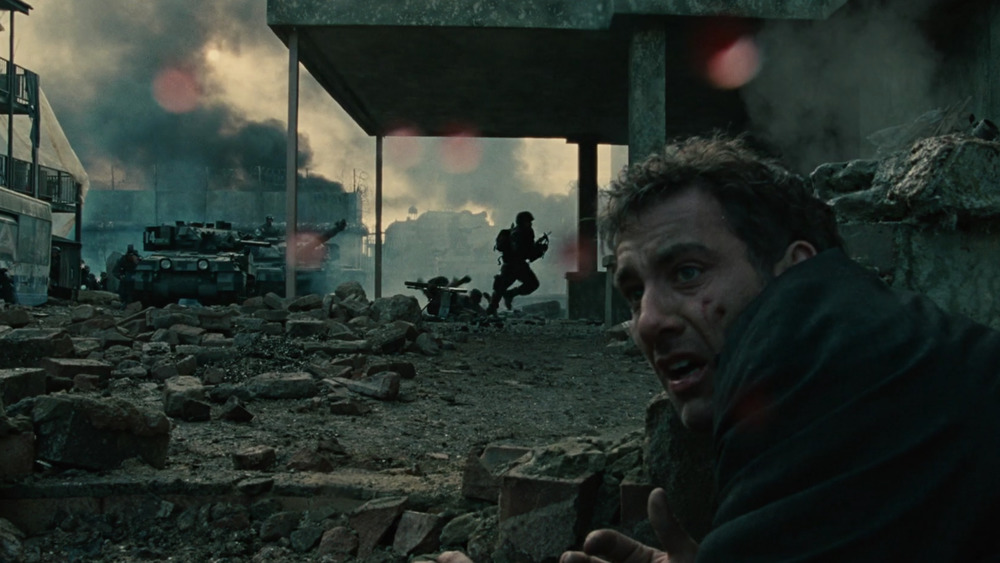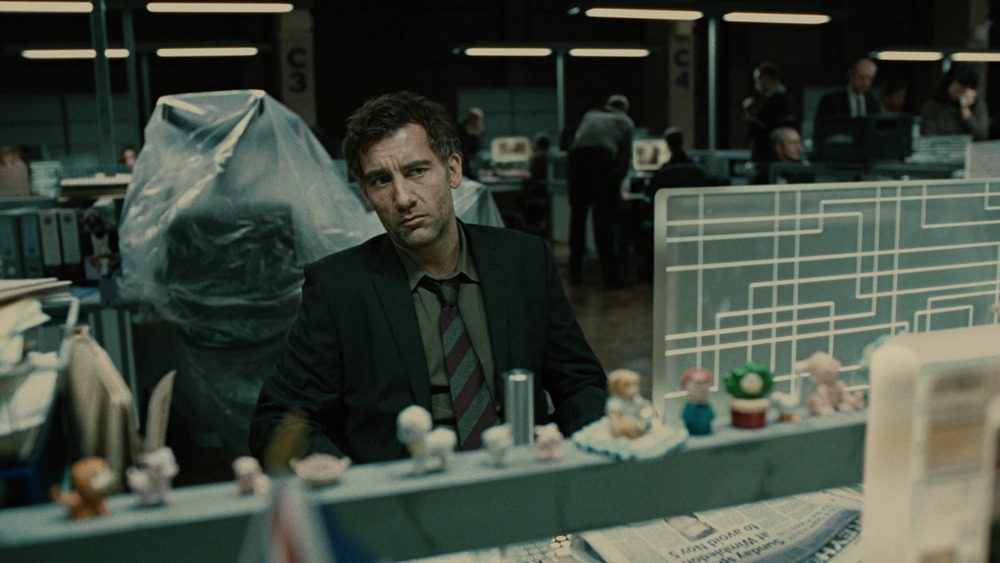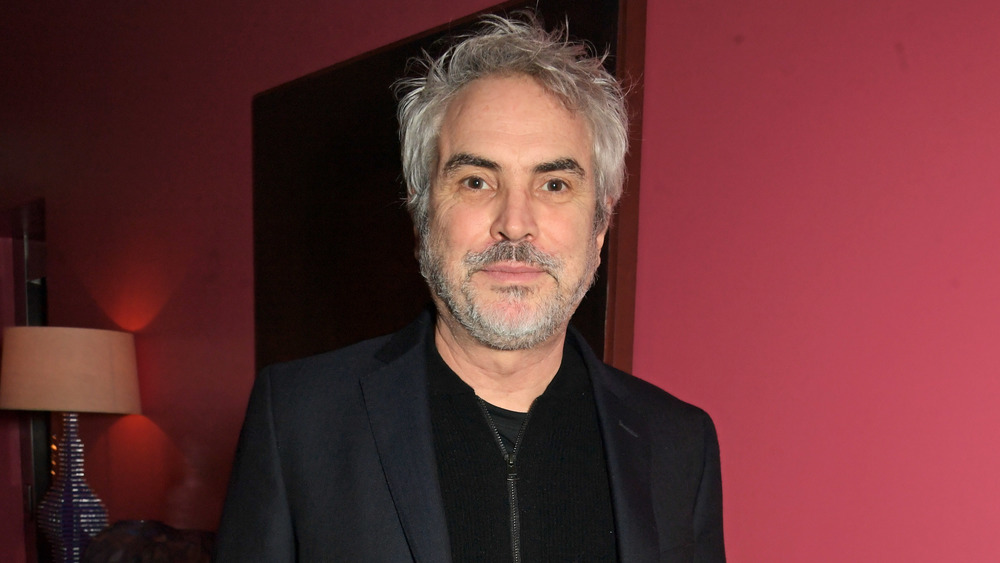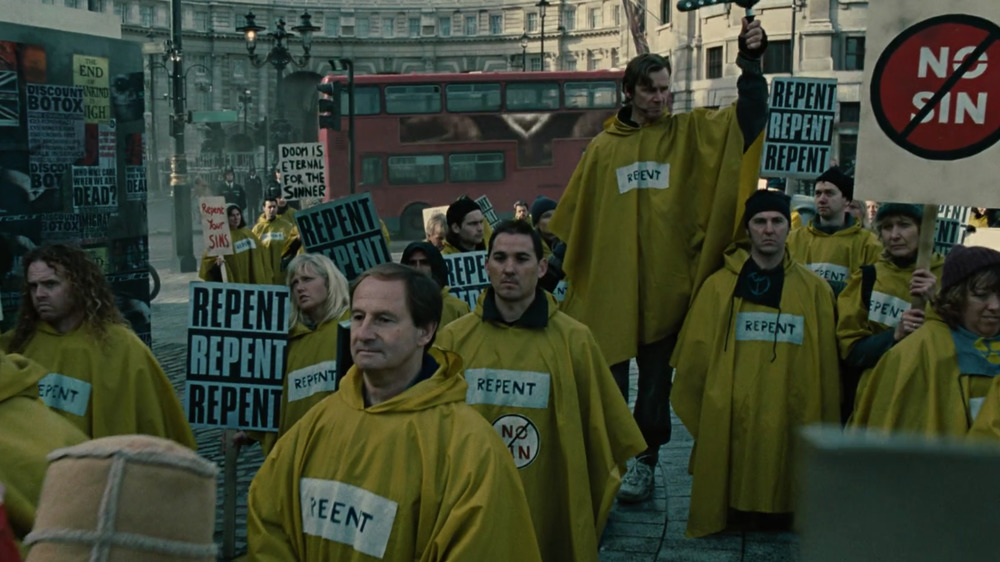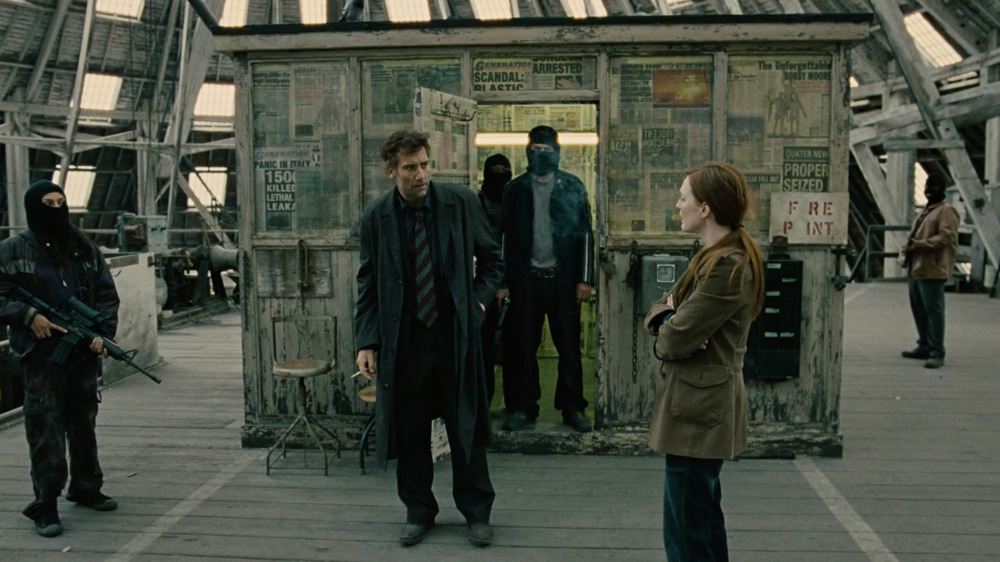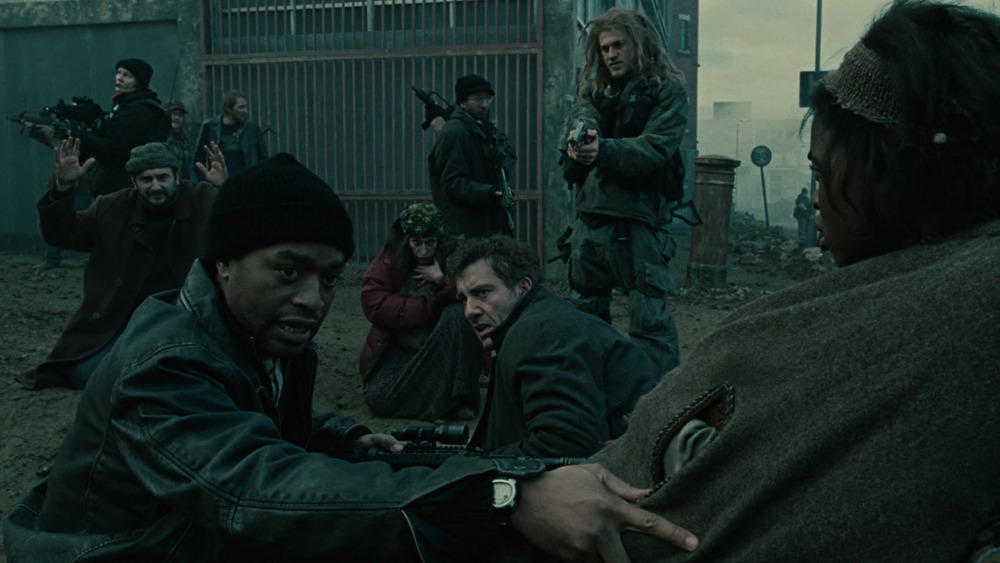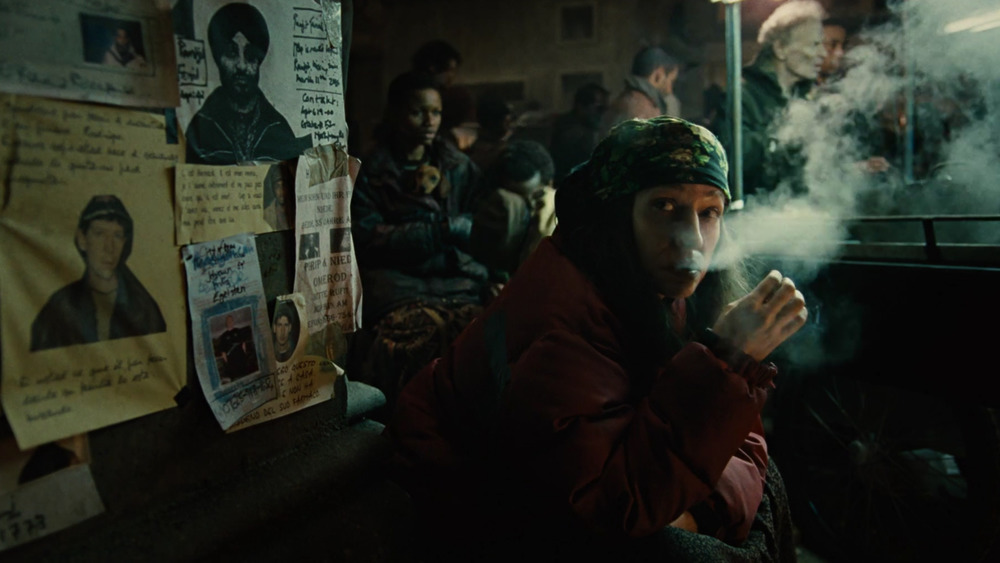Why Children Of Men Is The Best Sci-Fi Movie Of All Time
A truly great film must stand the test of time. Children of Men, which is more than a decade old at this point, has emerged triumphant. Few would have expected this: The film's release in 2006 was a lackluster affair, earning $70 million worldwide on a $76 million budget. Granted, releasing such a morose movie at Christmas was not the best production decision. That cheerful holiday is hardly a time when moviegoers are looking to descend into an apocalyptic world, wrought with global sterility. Release date withstanding, this sci-fi masterpiece was already a difficult sell: Its most bankable star, Julianne Moore, is killed 28 minutes into the film, and it lacks the sort of flashy techno-gadgetry that woos audiences into theaters.
Nevertheless, this Alfonso Cuarón-helmed epic has earned more and more praise over the years since its debut, and continues to be discovered by cinema lovers. Time has done nothing but sweeten Children of Men's allure and allowed the rest of us to catch up with its legendary truth. It still feels fresh and vivid, helped by its avoidance of typical movie tropes and cliches that often plague the science fiction genre. Children of Men truly is the best sci-fi movie of all time, and we're excited to explain exactly why.
It quickly paints a picture of a world in crisis
Children of Men sets a tone so efficiently, you hardly recognize its happening. The opening moments feature audio of news coverage playing over a black screen, which suddenly flashes to an image of a coffee shop, packed wall to wall with glum patrons. They are all engrossed in the news, which is covering the death of the world's youngest person, Baby Diego, who was stabbed by an angry fan. A rabid crowd had responded by beating the assailant to death.
Theo Faron (Clive Owen) makes his way through the captivated news watchers and orders himself a black coffee. A single camera shot follows Theo out to the street where he nonchalantly adds some liquor to his brew. Suddenly, the coffee shop he was just in explodes, shooting a plume of debris into the streets of London. A woman steps out, carrying her detached arm. The ringing in Theo's ears continues as a high pitched tone that leaks into the following scenes.
This opening is an incredibly succinct introduction to both the local and global climate the movie takes place within. It lays the story foundations in about 90 seconds, without any lazy exposition or coddling. Not only do we feel this world's despair, but also its numbness, which envelops Theo as he meanders through his daily life.
It feels simultaneously futuristic and mundane
The technology of 2027 is a mundane reality in Children of Men. There is a glimmer of the future in Theo's office, glimpsed as the camera pans across a mourning population, wearily absorbing footage of Baby Diego's death on advanced computer monitors. But really, the flashiest look we get at a distant future comes during a dinner conversation, when one of Theo's relatives plays with a high-tech Rubik's Cube. But even that device is only modestly impressive, and is clearly reserved for those rare few with means.
Societal issues take precedence over the tech advancements of Children of Men's far-off calendar date. This helps the world the characters navigate feel alarmingly current. Set designers opt for a run-down effect, even in public spaces featuring cutting-edge technology. This decision drives home Children of Men's dystopia. After all, there wouldn't be much reason for upkeep of a world destroyed by infertility. Rather than inserting impressive gadgets to transport us to the future, Cuarón relies upon the story. All of this makes the film feel as though it could be happening somewhere in the world, right now.
It lets the background explain the world
Cinema often enables exposition through dialogue. This can feel enormously lazy. Our brains have trouble grasping the reality presented to us, because we are perfectly aware of the fact that no one talks like characters delivering exposition. Children of Men lets the set explain the complexities of its world instead to tremendously powerful effect.
Rather than showing Theo meeting up with his friend, the film shows his walk through a crowded train station, where refugees are being detained, caged, and shipped elsewhere. Rather than offering a simple conversation about relationship status, we get information on new apocalyptic religious affiliations and the stress they place on the dating scene. Alfonso Cuarón does a wonderful job of trusting his audience to piece together the whole picture he is painting through these small moments, and it pays off massively.
Make no mistake: Though it's largely delivered through imagery and design, Children of Men's world-building is vast. From shots of news coverage to glimpses of graffiti across town, there is nothing on screen that isn't intentionally there. A prime example would be the words sprawled across concrete on Theo's trip to visit his friend, Jasper (Michael Caine): "Last one to die, please turn out the light."
It features an amazing array of single camera shots
Right around the time that Chiwetel Ejiofor guns down a couple police officers in the middle of the road, you realize that the past three minutes have been one continuous take. This particular take goes all the way back to the moment a flaming car rolls down the hill, and an angry mob descends to throw Molotov cocktails at the characters' car. It's an incredible shot which is unequalled — aside from a six minute ordeal later in the film, featuring Clive Owen navigating the streets of a refugee camp during an active battle.
For Children of Men, Cuarón sought out his friend and longtime cinematographer, Emmanuel Lubezki. Lubezki sports an impressive resume that has gone on to include The Revenant and Gravity. His skill is on full display here: The longer tracking shots used throughout Children of Men draw the viewer into the dystopia with unique force. The handheld camera movements manage to avoid the pitfalls of the shaky camera effect that Hollywood fell in love with for a few years in the late 2000s (a la Cloverfield), while still making us feel like we are trudging along right next to the characters.
It isn't afraid to kill off its stars
There is a certain element of fear missing from many films: The stars on screen feel removed from danger, for the simple fact that they're the stars. We are perfectly aware that while Tom Cruise may be dangling from the side of a plane, he is going to be just fine, because we're only halfway through the film. In contrast, Children of Men injects uncertainty into its characters' fates by killing one of its leads, Julianne Moore, less than half an hour into the film.
A little while later, another one of our favorite characters, played Michael Caine, drops dead in the woods. The fear that every character feels leaks out of the screen and elevates our heart rate: We know, as they do, that any of them could be next. There are even instances in which primary characters are killed in the background, as the camera moves on without them. No one is safe, and no one is even particularly important, in the grand scheme of the story being told. This laces every action sequence with a tension unmatched in any other science fiction film.
It doesn't feel like science fiction -- it feels real
Much of the technology in Children of Men doesn't feel new and fresh. Really, it feels old and unmanaged. These derelict products of science present a world that has lost hope: Without a future for humanity, there is no need for maintenance or advancement. Thus, our technology and buildings fall to the wayside. The wonderful set design mixed with the movie's camera work results in a realistic representation of Children of Men's bleak 2027 reality: It never feels impossible, impressive, or unreachable. This makes Children of Men a very pure work of science fiction, in which little distracts from the future it imagines and just how possible its horrors feel.
In this, Children of Men stands distinctly on its own in the world of cinema, and is likely to remain an evergreen film. What keeps people coming back for multiple viewings are the characters, the world-building, and the deep themes explored. Its lack of overt science fiction tropes emphasizes all of these qualities and ensures its place in the cinematic canon.
Alfonso Cuarón is an amazing director
After the lackluster box office performance of 2006's Children of Men, Alfonso Cuarón took a five year hiatus from filmmaking. The director was demoralized by the whole ordeal, as well as being largely overlooked at the Oscars: The film got three nominations, none of which resulted in a win. We wouldn't have the pleasure of another Cuarón-directed film until 2013's Gravity.
The Harry Potter and The Prisoner of Azkaban director pours every ounce of himself into his movies. This shines through in his attention to detail: Every frame is filled with minute elements that all have a purpose, from newspaper clippings to the color of an extra's jacket. His next outing at the Oscars would see the director garner a whopping seven wins for Gravity, including Best Director and a win for his cinematographer, Emmanuel Lubezki. His next film, Roma, enjoyed similar acclaim, earning Cuarón another Best Director statue.
There is no denying that Alfonso Cuarón is one of the greatest filmmakers of our time. His cinematic visions are always captivating. His ability to give his films a pulse is magnetic. There is something primal he taps into: You can't pull your eyes away from the screen when he's in charge of what's on it. Children of Men is an epic display of his talent which has only gotten better with time.
It raises unique existential questions about the future of humanity
It isn't just the ambiguously optimistic ending of Children of Men that keeps your brain's wheels turning after the credits roll — it's also the very nature of the entire film. There is a deep discussion at the film's heart as to our purpose in life. If humanity had no future generations to look forward to, Children of Men asks, what would be the point of doing anything?
This is a valid query which can be difficult to answer. Alfonso Cuarón decides to answer it in his own way, on a global scale: Apparently, we would all fall into a big pit of despair and society would implode. The end of the world is always an intriguing topic, and there is no shortage of movies that deal with it — but Children of Men is unlike any of them. Rather than attribute its destruction to a sudden mass event, such as a meteor or nuclear war, humanity is here being subjected to a slow, drawn-out death. The answers to the underlying question are continuously pouring out of Children of Men as its slow-motion nightmare plays out, which is part of its magic.
All the acting is phenomenal
Children of Men features a magnificent display of acting prowess from almost every single one of its actors. Even the army of extras featured throughout the film all play their parts wonderfully. With all the nuance involved in Children of Men, the background actors need to be at the top of their game — and so they are.
Clive Owen dazzles in the lead. His ability to capture a man who gave up before humanity did doesn't feel forced — it simply feels like who he is now. The transition from depressed cynic to hero willing to die for humanity is an inspiring journey, but never a forced or cheesy one. Juliane Moore pulls you in so well that her violent death feels especially devastating. Clare-Hope Ashitey radiates quiet strength. Michael Caine is strange, warm, and unforgettable. There are no weak links in this chain.
There is a lack of close-up shots in this film, but we still feel every emotion, even with the entire world parading across the background of each scene. A lot of the time, the actors aren't presented front and center, which evidences a cast and crew more worried about the film as a whole and less about personal glory. The final product speaks volumes as to the talent present on the set of Children of Men.
There are no traditional villains in the film
A lot of films feature two primary types of character: heroes and villains. Our primary protagonists are usually fighting against adversaries seeking their downfall. Many times, the villains can be just as captivating as the heroes, but the line drawn between them gives us something to cheer about. In contrast, Children of Men may have antagonists who appear to be detrimental to the endgame, but they are anything but traditional villains.
For the first chunk of the film, freedom fighters known as the Fishes seem like they are fighting against the injustices of the world. Developments later in the film prove that their motivations are tainted by a blind sense of virtue. They don't feel associated with any evil machinations though — they only feel righteous. Chiwetel Ejiofor's character Luke may make some brash decisions, but there is still a softness to the man that steers him away from villainy — he's more of a misguided hero.
The indifference of the world bleeds through as the main villain in Children of Men: Every character is merely taking their own approach on how to face its tyranny. This characteristic places the movie in a class all its own — one in which every person we see isn't so much right or wrong as much as they are all drowning in a dystopian hellscape.
The subject matter's despair lingers in every frame -- and so does its hope
Children of Men is undeniably melancholy. Humanity has failed to produce another generation for over 18 years, and it has taken a psychological toll on every person on Earth. Despair is implanted into every moment. Every building looks derelict. All the actors' clothes are old and ragged. The skyline is permanently bathed in a dreary grey. Even moments of sunshine are sullied by humanity's ability to create its own despair.
There is an underlying message of hope, but Children of Men places the responsibility of seizing it on its flawed characters' shoulders. Children of Men is anything but futile, however — its misery actually highlights the promise of its ending. Every frame is littered with destruction, but our heroes march through it towards their final destination. Choosing to ignore cosmic indifference and move to a hopeful future is our most human characteristic. Children of Men puts this on a pedestal and forces you to admire it. It locks your eyes to the screen so ferociously that it will make you forget you made popcorn before the movie started. It wants you to see how bad the world is, so that you might understand how great it could be. That doesn't just make it a masterpiece of science fiction — it makes it a masterpiece, full stop.
